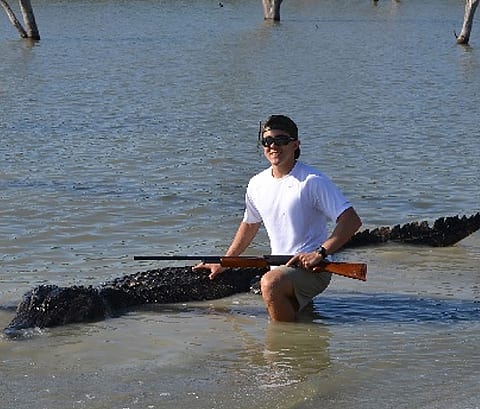 With the open season in progress for gators in non-core counties, hunters are hoping to harvest one of the 250,000 alligators living in Texas.
With the open season in progress for gators in non-core counties, hunters are hoping to harvest one of the 250,000 alligators living in Texas.
The open season in non-core counties occurs April 1 through June 30. During this time, hunters can only take gators on private property with the permission of the landowner.
During the year, alligator hide tags are issued to private landowners in core and non-core counties. Biologists research private lands to determine the amount of gators living on their area and, depending on the gator population, tags are given out to the owners. The owners can then charge hunters to fill those tags. The “non-core” counties allow one alligator per person, per season and all hunters are required to have a valid hunting license. During the spring season, hunters may take one alligator on properties in non-core counties.
Game wardens are made aware of how many tags are given in their areas, which gives them an idea of where hunters will be during the season. Angleton Game Warden Capt. Nick Harmon keeps his eye on how many gators are taken and where they are taken.
“We have to make sure the hunters use the tags in the areas they were issued for,” said Harmon.
In core counties, a firearm (centerfire or rimfire) may be used to dispatch a gator in a taking device on private property. On private lands in the non-core counties, gators can be taken by firearm (center fire only) only in the spring season.
Jonathan Jacobs, an Austin-area gator hunter, knows that dispatching a gator needs to be fast and effective to reduce the risk of injury.
“Use a .22 to dispatch,” he said, “It’s the only way to dispatch quickly.”
Harmon said that even though using a firearm may be legal to dispatch an animal, he insists that hunters check with any city regulations before discharging a firearm.
In many instances, gators wander from public creeks to private lakes. In that case, the landowner can use one of his tags to take a gator if it’s in season. If it’s not, even though the gator is on their property and possibly a danger, the owner cannot kill that gator. If the gator is killed without a tag, the landowner can be subject to a fine.
Harmon said the landowner should contact an alligator nuisance control hunter to capture the gator. The control hunter will come out and removal of the gator for a fee.
Harmon recommends private landowners watch their ponds for gators and if they see a gator don’t try to move or feed it.
“If you don’t feed them or provide them a place to live, they won’t be there,” he said.

